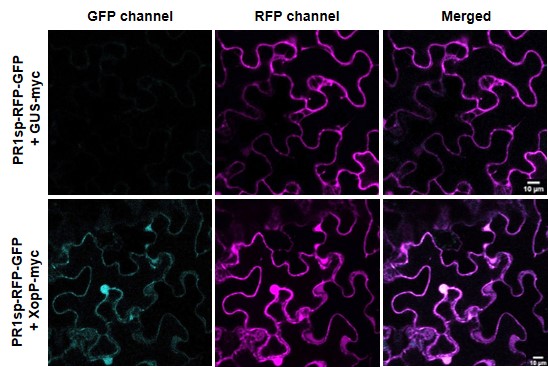Michalopoulou et al. identified a core Xanthomonas effector that targets the host exocyst complex and disrupts host immunity. Plant Cell. (2022) https://doi.org/10.1093/plcell/koac162
By Vasiliki Michalopoulou1,2 and Panagiotis Sarris1,2,3
1 Department of Biology, University of Crete, 70013 Heraklion, Crete, Greece
2 Institute of Molecular Biology and Biotechnology, Foundation for Research and Technology-Hellas, Heraklion, 70013, Crete, Greece
3 Biosciences, University of Exeter, Exeter, United Kingdom
Background: Many phytopathogenic bacteria use type-III secretion systems to secrete protein effectors into the host plant cell cytoplasm, promoting their virulence. In defense, plants have evolved intracellular Nod-like receptors (NLRs) that recognize these effectors and activate host immunity. Some plant NLR receptors contain noncanonical protein domains known as integrated domains (IDs), which function as decoys for pathogen effectors. The origin of IDs as decoys may be from the duplication of the real targets of these bacterial effectors in host cells.
Questions: What host components are targeted by pathogen effectors? What are the mechanisms of virulence in these target/effector interactions? What essential physiological processes of the host plant do the effectors disrupt?
Findings: Building on our recent description of the NLR–ID model for effector interaction and defense activation, we screened a library of IDs with Xanthomonas core effectors and discovered several interesting interactions. We found that XopP, a Xanthomonas core effector protein, interacted with a host Exo70-like ID without activating host immunity. Our in-depth investigations revealed that XopP interacts directly with EXO70B1, a component of the host exocyst complex. XopP blocked exocyst-dependent exocytosis of various immunity-promoting molecules in Nicotiana tabacum, Nicotiana benthamiana and Arabidopsis cells, including pathogenesis-related protein-1A (PR1a), the transmembrane immune receptor FLS2, and callose.

Exocytosis of PR1 is inhibited by XopP, as shown in N. benthamiana leaves by GFP fluorescence, which is quenched in the acidic environment of the apoplast.
Next steps: We will conduct further screening to determine whether XopP targets other EXO70 isoforms. In this way, XopP will be a valuable tool to understand the role of effector-exocyst interactions during plant defense.
Vasiliki A. Michalopoulou, Glykeria Mermigka, Konstantinos Kotsaridis, Andriani Mentzelopoulou, Patrick H. N. Celie, Panagiotis N. Moschou, Jonathan D. G. Jones, Panagiotis F. Sarris. (2022). The host exocyst complex is targeted by a conserved bacterial type-III effector that promotes virulence



